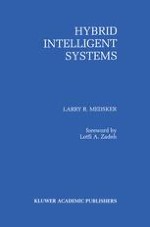1995 | Buch
Über dieses Buch
Hybrid Intelligent Systems summarizes the strengths and weaknesses of five intelligent technologies: fuzzy logic, genetic algorithms, case-based reasoning, neural networks and expert systems, reviewing the status and significance of research into their integration. Engineering and scientific examples and case studies are used to illustrate principles and application development techniques. The reader will gain a clear idea of the current status of hybrid intelligent systems and discover how to choose and develop appropriate applications. The book is based on a thorough literature search of recent publications on research and development in hybrid intelligent systems; the resulting 50-page reference section of the book is invaluable.
The book starts with a summary of the five major intelligent technologies and of the issues in and current status of research into them. Each subsequent chapter presents a detailed discussion of a different combination of intelligent technologies, along with examples and case studies. Four chapters contain detailed case studies of working hybrid systems. The book enables the reader to: Describe the important concepts, strengths and limitations of each technology; Recognize and analyze potential problems with the application of hybrid systems; Choose appropriate hybrid intelligent solutions; Understand how applications are designed with any of the approaches covered; Choose appropriate commercial development shells or tools. An invaluable reference source for those who wish to apply intelligent systems techniques to their own problems.
Anzeige
